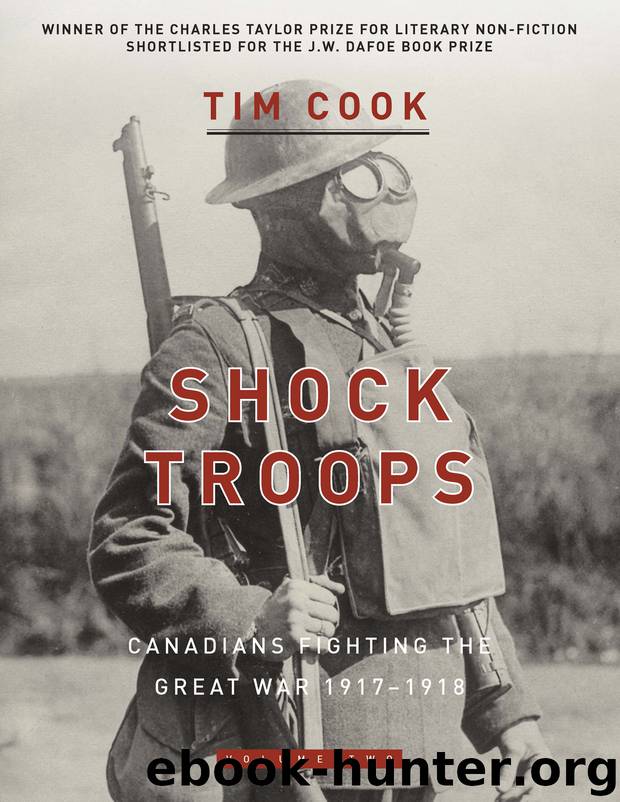Shock Troops by Tim Cook

Author:Tim Cook
Language: eng
Format: epub
Publisher: Penguin Canada
Published: 2016-08-15T16:00:00+00:00
CHAPTER 24
“EDUCATED LARGELY BY OUR OWN MISTAKES”
November 1917–March 1918
“The year 1917 has been a glorious year for the Canadian Corps,” wrote Sir Arthur Currie to William Hearst, premier of Ontario. “We have taken every objective from the enemy we started for and have not had a single reverse. Vimy, Arleux, Fresnoy, Avion, Hill 70 and Passchendaele all signify hard fought battles and notable victories. I know that no other Corps has had the same unbroken series of successes. All this testifies to the discipline, training, leadership and fine fighting qualities of the Canadians.” Currie only regretted the high casualties sustained by his “gallant comrades.”1 The record of the Canadian Corps surely revealed its soldiers to be the shock troops of the BEF, but those at the sharp end had far different concerns in the aftermath of the battle for the bog.
The more than 16,000 casualties suffered at Passchendaele had dulled the corps’ blade, with morale among front-line troops having taken a significant blow during that terrible month of fighting. Private E.W. Russell of the 5th Battalion witnessed a veteran soldier, who was returning from a tour in the front lines, snap under the pressure. When the survivors limped to the rear, the veteran “made a hole in the ground, drew out the safety pin from a Mills bomb, put it in the hole, his foot over it, and thereby lost a leg.”2 He had calculated the odds and was willing to trade a leg for freedom from hellholes like Passchendaele. Russell was understandably shaken.
In the aftermath of battle, the regular grumbling and grousing of soldiers began to take on a sharper edge. William Antliff, a former commerce student at McGill University and a member of No. 9 Canadian Field Ambulance, remarked in one revealing letter that, no matter what the politicians or generals were telling the public back home, “In the opinion of a great many [fighting men], we can never hope to break thru in the West.” He believed that talks should be started to find a peaceful solution, and declared, “Put to a vote of the Tommies, I guarantee it would be passed by a majority of 9 to 1. Of course it is all very well to say let the war go on when one is sitting in a comfortable chair before the fire…but it is a different thing when one is a poor infantry man who has to go into a living hell which is his lot every time he goes over the top!”3 Never had morale been lower in the elite Canadian Corps, or in the larger BEF; British war journalist Philip Gibbs, who observed the British force in the months following Passchendaele, remarked: “For the first time the British Army lost its spirit of optimism, and there was a sense of deadly depression among many officers and men with whom I came in touch. They saw no ending of the war, and nothing except continuous slaughter.”4
The Canadians had been pushed to the limits of
Download
This site does not store any files on its server. We only index and link to content provided by other sites. Please contact the content providers to delete copyright contents if any and email us, we'll remove relevant links or contents immediately.
| 19th Century | 20th Century |
| Exploration | First Nations |
| Founding | Pre-Confederation |
| Province & Local | War of 1812 |
Cat's cradle by Kurt Vonnegut(13902)
Pimp by Iceberg Slim(12949)
Underground: A Human History of the Worlds Beneath Our Feet by Will Hunt(11266)
4 3 2 1: A Novel by Paul Auster(11078)
The Radium Girls by Kate Moore(10921)
American History Stories, Volume III (Yesterday's Classics) by Pratt Mara L(4829)
Perfect Rhythm by Jae(4629)
Wiseguy by Nicholas Pileggi(4602)
The Fire Next Time by James Baldwin(4352)
Paper Towns by Green John(4178)
A Higher Loyalty: Truth, Lies, and Leadership by James Comey(4042)
Pale Blue Dot by Carl Sagan(4018)
The Mayflower and the Pilgrims' New World by Nathaniel Philbrick(3921)
The Doomsday Machine by Daniel Ellsberg(3741)
Too Much and Not the Mood by Durga Chew-Bose(3701)
Killers of the Flower Moon: The Osage Murders and the Birth of the FBI by David Grann(3627)
The Borden Murders by Sarah Miller(3597)
The Sympathizer by Viet Thanh Nguyen(3523)
Killing England by Bill O'Reilly(3465)
